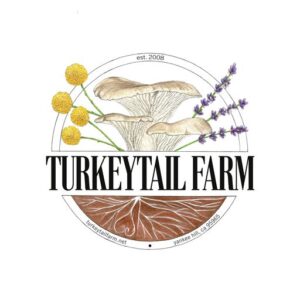
Cheetah Tchudi & Samantha Zangrilli
Cheetah Tchudi is the Program Director at Butte Remediation and a farmer at TurkeyTail Farm, a small diversified farm serving Butte, County California. Cheetah is a mycologist by training, and at TurkeyTail Farm grows gourmet and medicinal mushrooms as well as manages a diversity of projects including lamb, pork, fowl, fertility management, construction and heavy machinery operation. His wife, Samantha Zangrilli is also a full time farmer. She tends a flock of 100 ducks for eggs and pasture management, helps maintain the pigs and sheep, and manages a 1 acre garden for the production of cut flowers, dried floral arrangements, value added herb products and plant distillates like hydrosols and essential oils.
OFRF staff recently connected with Cheetah at the EcoFarm Conference, and invited him to share a guest farmer blog post with us. In this post, Cheetah talks about how USDA farmer support programs have benefited TurkeyTail Farm, and offers advice on how to approach working with these national support organizations to generate financial support and incentivize your farm projects.
…
The Natural Resource Conservation Service (NRCS, a branch of the USDA) provides farmers, ranchers and timberland owners with funding to employ best management practices. The program is called EQIP: Environmental Quality Incentives Program. This cost-share program provides funding for a diversity of wildlife habitat improvement, soil, and water conservation practices on functional farms. This program is not a grant based system, but is intended to support growers in their efforts, and as such is termed a “cost-share” program. The distinction is significant because it is understood that the USDA funding may not always completely cover the full cost of the work. Nonetheless NRCS support may take you a few steps closer to your ultimate goals.
 On our farm we have been working with NRCS for over 10 years. On our land we have completed cost-shares that encompass brush clearing, targeted grazing, erosion control, pasture seeding, and development of bird and bat habitat. Most recently we have drilled an additional water-well for livestock. As part of this cost-share we have a network of gravity fed livestock wells and added water storage capacity, a definite boon in the era of megafires and climate chaos.
On our farm we have been working with NRCS for over 10 years. On our land we have completed cost-shares that encompass brush clearing, targeted grazing, erosion control, pasture seeding, and development of bird and bat habitat. Most recently we have drilled an additional water-well for livestock. As part of this cost-share we have a network of gravity fed livestock wells and added water storage capacity, a definite boon in the era of megafires and climate chaos.
The NRCS EQIP has been a great resource for us as ecologically conscious agrarians. It has helped us to incentivize doing what we want to be doing. My advice is to set concise goals, give yourself plenty of time to accomplish the conservation practice, and most of all follow through. It is a process, you have to be committed and know what you’re doing. Agriculture is challenging… You got this.
Let’s talk about the USDA SARE program. SARE stands for Sustainable Agriculture Research and Education. Food, farming and innovation. Let’s unbox it: It’s a program to conduct research and educate farmers, extension agents, and ag professionals. SARE operates in different regions: North Central, North East, South and the West. There are a host of different programs ranging from on-farm research to education. As a farmer, you will want to look into the Farmer/Rancher Grants. If you can work with an educational institution a Producer/Professional grant is also an option.
If you are considering authoring a SARE grant, I encourage you to start early. Their application time is in November and you want to be way ahead of that. I feel the need to emphasize this. You need to be planning two years ahead. Make sure your operational budget for the grant is totally separate from your farm, and plan ahead for tax time.
Grant writing is difficult. You have to apply yourself, and there is no guarantee that your work will pay off. The flip side of that is you can do something radical. You can get the fiscal support you need to answer your questions, something that is important to your career and field of work. And at the same time you can do something nobody has ever done before. Let me reiterate that; you are capable of doing something nobody has ever done before!
As a farmer, you fulfill a fundamental need. You feed people. And sometimes the work we do is overlooked. Federal funding is a way to develop your farm, your career, and get some much needed support. It takes work, but can be hugely rewarding. After all, you’re a farmer. You got this.
By guest author, Cheetah Tchudi
…
Learn more:
Natural Resources Conservation Service (NRCS)
Environmental Quality Incentive Program (EQIP)


